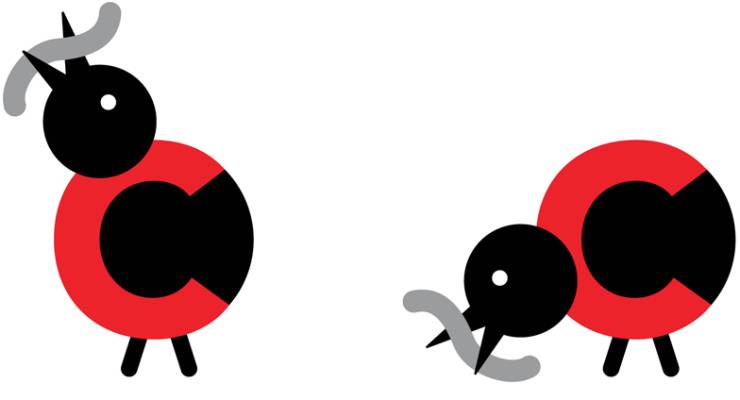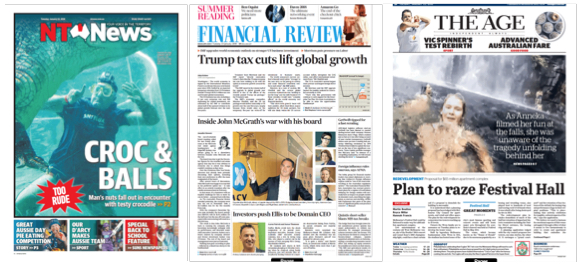
FRYDENBERG CHARGES UP
Energy and Environment Minister Josh Frydenberg is standing by his predictions of a boom in electric car use after the Coalition again veered towards internal conflict over energy policy. The Minister has predicted more than 1 million electric cars will be on Australian roads by 2030 and yesterday rejected claims by climate sceptic Coalition backbencher Craig Kelly that electric cars produce more carbon emissions than fuel-operated vehicles.
“When taking into account the current average emissions of the national electricity grid, the Nissan Leaf and the Renault Zoe already produce less emissions per kilometre travelled when compared to an equivalent size vehicle,” Frydenberg told Fairfax.
While there are calls from the industry to subsidise electric cars, Frydenberg is only talking about improving access to charging stations.
The debate about cars comes as Victoria and South Australia brace for a week of hot weather that will test their infrastructure, with the Australia Institute pointing to 14 coal-fired power station failures in six weeks ($) as evidence the ageing plants need to be replaced. Figures released by the Clean Energy Regulator reveal that Australia is on track to meet its 2020 Clean Energy Target. While the Clean Energy Finance Corporation is driving investment, concerns remain about growth plateauing after 2020.
With Frydenberg doing battle with his party colleagues in public, his Labor counterpart Mark Butler has also taken a shot at his own — albeit over a very different issues — using a speech last night to criticise Labor’s “backroom buffoonery”. Butler is Labor’s current national president, and said he wanted to see rank and file party members given more power but that efforts were being thwarted by factional bigwigs.
SHUT DOWN SHUTS DOWN
Senate Democrats and Republicans have reached a deal to end the US government shutdown that came into effect on Friday night, Washington time.
An impasse had been reached after Democrats demanded negotiations on the future of the undocumented immigrants known as Dreamers, who crossed into the US at a young age and now face deportation. Republicans were attempting to pass a bill re-authorising government spending.
Overnight, Senate Democrats announced a deal had been struck, with a procedural motion cleared and a vote in both houses expected soon. The government will open but will only be funded for three weeks, with the Dreamers issue to be debated in that time.
With world leaders at Davos, Donald Trump‘s presidency has received a boost from the International Monetary Fund, which has updated its economic outlook and predicted the President’s tax cuts will push global growth to 3.9%. The catch? The short-term high for the US and global economy is expected to come at the cost of longer term growth as the US grapples with expanding government debt.
AND THE WINNER IS … HONG KONG!
Sydney might have the world’s best harbour, but according to think tank Demographia, it also has the second least affordable housing in the world.
In a study, the organisation ranked cities by house prices to median incomes, with Sydney’s ratio coming in at a terrible 12.9, beaten out only by Hong Kong which had a ratio of 19.4. Melbourne ranked fifth, with a ratio of 9.9.
The ranking system has been criticised by CoreLogic on the basis it looks only at house prices and not at rental housing.
READ ALL ABOUT IT
Australian Open: Novak Djokovic out in fourth round as Hyeon Chung powers to victory
Richmond train crash: ‘Horrifying’ accident at station in Sydney injures 16
2016 election: AEC failed to account for all ballot papers
WHAT’S ON TODAY
Los Angeles: The nominees for the 2018 Academy Awards are announced. Australian Margot Robbie is expected to get a nod for her role in I, Tonya.
Melbourne: A public memorial will be held to commemorate the anniversary of the Bourke Street attack, which left six people dead.
Sydney: Mathematician and YouTube star Eddie Woo delivers the Australia Day address.
Canberra: The Australian government will announce that Foreign Minister Julie Bishop has joined the End Malaria Council, which is chaired by US philanthropist Bill Gates. Gates is calling on Australia to take a leading role ($) in clearing malaria from Asia within a decade. He has also called on Australia to increase its foreign aid.
THE COMMENTARIAT
Australian success story offers no scope for contrition or cringe — Nick Cater (The Australian $): “Since Greens leader Richard Di Natale confidently predicts we’ll be rid of Australia Day within a decade, we might well be heading for a constitutional referendum on national self-abolishment by 2028.The push to abolish Australia is not popular, yet its advocates are noisy, resourceful and driven by an irrepressible desire for change for its own sake.”
CRIKEY QUICKIE: THE BEST OF YESTERDAY
The female workforce revolution is finally arriving — Bernard Keane: “These days, we’re still wasting billions protecting defence manufacturing while relying on textile imports from China, India and Bangladesh. But because of its increased funding for health, childcare and early childhood, primary and secondary education — funding to which it has been dragged kicking and screaming by Labor’s staunch opposition to funding cuts — the Turnbull government for once has backed female-dominated industries.”
‘Australia Day’ will fail for the same reason same-sex marriage succeeded — Guy Rundle: “Conservatives trying to turn this into a culture war are helping hurry January 26 to extinction — because as soon as the contested nature is acknowledged, what remains of the day’s mystique has been wholly surrendered.”
McLachlan to fight Rocky Horror claims — Emily Watkins: “The decision to take court action follows an incredibly sympathetic interview given to The Sunday Telegraph and published yesterday, with McLachlan and his partner Vanessa Scammell saying the allegations had “annihilated” his career. The exclusive interview included numerous references by McLachlan to his “Benny Hill” sense of humour and his devastation at the allegations.”
HOLD THE FRONT PAGE








Oh my god I can’t believe I’m agreeing with Craig Kelly. Josh Frydenberg is incorrect to say on average an electric car will produce less emissions than a petrol car of similar size in Australia. Currently it’s still just in the petrol cars favour, granted that will change soon with the energy mix improving and we should be thinking of the future. What Frydnberg doesn’t take into account is that the majority of charging will be done in Victoria, NSW and QLD (most cars and the worst emissions profiles) and it will be done at times that renewables like solar will not be producing (after work during peak times or if on a timer during the night). Investing in public transport is still better and like trains and trams they use energy when the renewables or firing.